Kansas
Laws against gay sex ruled unconstitutional- but Kansas won’t drop ban
A bill pending in the Kansas Legislature would remove language in the state’s criminal sodomy law that targets LGBTQ people. Advocates say action is decades past due.


By Blaise Mesa | TOPEKA — Intercourse between same-sex couples technically remains a crime in Kansas even though the provision in state statute was ruled unconstitutional 19 years ago.
Since then, multiple attempts to remove the outdated language have failed.
The latest legislation to change the law has languished in a Statehouse committee without a hearing for over a year.
That bill would remove a line from the Kansas criminal sodomy law that makes sex a crime for “persons who are 16 or more years of age and members of the same sex.” The U.S. Supreme Court ruled in Lawrence v. Texas in 2003 that such laws were unconstitutional.
“When it comes to something that’s just blatantly unconstitutional, there should be agreement that we follow the law,” said the bill’s sponsor Rep. John Carmichael, a Wichita Democrat. “We need to repeal it.”
The bill doesn’t change other portions of the sodomy law, and Carmichael says law enforcement has been supportive of the changes for years, yet nothing has happened.
Rep. Stephen Owens, a Hesston Republican who chairs the committee scrutinizing the latest legislation, said he hadn’t reviewed its details or decided whether to hold hearings on the bill. Owens said the committee will deal with other, higher-priority bills first.
The Kansas Bureau of Investigation says nobody has been convicted of same-sex criminal sodomy for at least five years. Still, Thomas Witt, executive director of Equality Kansas, said the provision has been used to discriminate against LGBTQ people even if they weren’t convicted.
Witt said Kansans were arrested for same-sex relations even after the Supreme Court’s ruling, but the last time he heard that happened was in 2013. The criminal sodomy law also prevented LGBTQ law enforcement officers from being sworn in because violating the statute was a violation of their professional standards. Those standards were later amended to allow LGBTQ officers.
“It is an insult that my life is criminalized,” Witt said. “It is a further insult that people in (the Legislature) think it should stay that way.”
Justice Horn, vice chair of the LGBTQ Commission of Kansas City, said the laws could also make people leave for cities with better civil rights protections. Horn, who is gay, said that hurts the community by hindering economic development while depriving it of diversity.
“I’ve thought plenty of times I could uproot and go to a place where I don’t have to deal with these issues,” Horn said. “I want our kids to grow up, and our youth and the generation coming up to not have to deal with this.”
Witt said the issues have subsided, but as long as it remains codified in state statute the issues could quickly become relevant again if the Legislature’s opinion of LGBTQ people grows worse, which he said is happening. He pointed to the bill last session that limited how transgender people could play sports as evidence of this.
Sharon Brett, legal director for the American Civil Liberties Union of Kansas, said outdated state laws are common, but anti-LGBTQ laws send a message to people that they aren’t welcomed in the state.
“It’s a deliberate decision not to amend the code,” Brett said, “to get rid of these provisions that have been ruled unconstitutional.”
Republican Sam Brownback created the Office of the Repealer when he was governor to remove outdated and unconstitutional statutes, but changes to the criminal sodomy law weren’t recommended.
The committee on Corrections and Juvenile Justice, where the bill is bottled up, has a full set of hearings next week. Bills preventing shackling of youth in court, allowing people convicted of felonies to receive food stamps and adding new requirements for officers serving search warrants are currently scheduled for discussion.
“Given the opportunity, we might look at” the legislation to rewrite the state sodomy law, said Owens, the committee chair. “I wouldn’t say that is a priority for us to look at this time just because of all the other corrections and juvenile justice matters.”
*******************

Blaise Mesa is the Social Services and Criminal Justice reporter for The Kansas News Service.
*******************
The preceding article was previously published by The Kansas News Service and is republished by permission.
Kansas
Topeka center & shelter for LGBTQ+ teens, to start services in July
The idea for Braided Haven began in 2019, when a transgender teenager was kicked out of their home after coming out to their parents
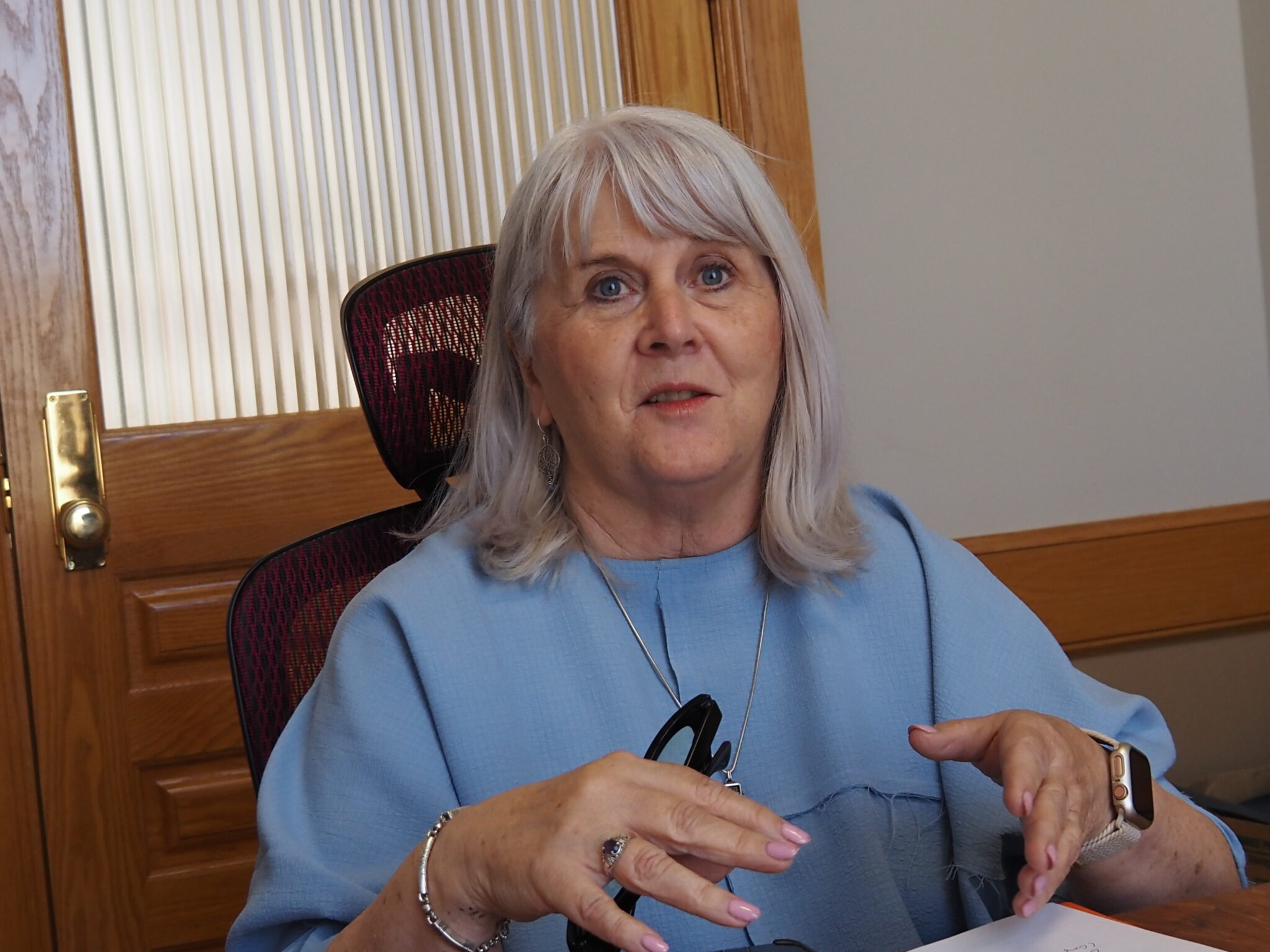
By Rachel Mipro | TOPEKA, Kan. – The idea for Braided Haven began in 2019, when a transgender teenager was kicked out of their home after coming out to their parents.
Darin Stephens and his husband, Brian Laird, were approached by their pastor at First Congregational Church, Tobias Schlingensiepen, after a high school counselor notified Schlingensiepen about the student’s situation.
The two took the student in and began researching available support options and services, such as health care and counseling.
“There was no one organization that was kind of trying to help these individuals,” Stephens said.
Stephens, along with Braided Haven executive director Kathleen Marker, discussed the inception of the organization for the Kansas Reflector podcast.
“I said to Brian, ‘We’ve got to help,’ ” Stephens said. “We’ve got to figure out how can we create an organization that as these individuals are being told by their parents, ‘You’re no longer welcome in our home,’ that we provide an inclusive environment, we provide an environment that they feel safe, they feel loved, and they feel connected with individuals who are trying to help and care for them.”
Stephens, Schlingensiepen and Laird, all board members of the organization, began researching and gathering in other community partners as the idea for both a shelter and drop-in service center coalesced. Schlingensiepen, a Topeka Democrat, was elected to the Kansas House in 2022.
The need for a shelter has grown more apparent in recent years as the Legislature passed wave after wave of anti-trans bills, and politicians go on hunts against rainbow drawings and rail against LGBTQ+ identities. This year, Republican lawmakers threatened to pull Kansas PBS funding over an LGBTQ+ documentary and tried to pass a law banning transgender youths from accessing gender-affirming care. In May, Kansas Attorney General Kris Kobach sued President Joe Biden’s administration over federal protections for LGBTQ+ students.
“These issues are not new,” Marker said. “They’ve been around forever. But what we do know is that with all of this rhetoric that’s going on, that means kids who are transitioning, or who want to transition, are also getting all of that negativity and misinformation. … That’s why it is so important to do this now.”
Braided Heaven’s drop-in center where LGBTQ+ people can access education, job training and service referrals, will open in July with a summer program geared toward high schoolers, and potentially middle schoolers.
“It’s a safe haven,” Stephens said. “It’s a community where you can be who you are, and feel comfortable with that and feel love and support of others.”
Logistics and licensing for the eight-bed shelter have proven more challenging, although assistance from a City of Topeka grant has helped. Marker estimated the house would be operational by fall, and would start with the 16-18 age group.
The organization also is requesting credentials from the Department for Children and Families to allow for foster care referrals.
Marker’s vision for the shelter is as a short-term home — either for a week or two, or a longer period as teenagers receive case management and mentoring.
“The ultimate goal would be to get them reconnected with their families, but that’s not always going to be the case,” Marker said. “So in some scenarios, if that is not safe for them and not where they need to be, we want to help them build that resilience and actually have the services that they need to be able to start their life independently with the support that they need.”
Stephens said the teenager who inspired the idea for the Braided Haven is now living independently and glad to know their situation was the catalyst to help others.
“This started out of that conversation across the table,” Stephens said. “In their mind, they were in a difficult period, but they now see, ‘Hey, this is what came out of my difficult period. You’re gonna be able to help a lot of people.’ ”
******************************************************************************************

A graduate of Louisiana State University, Rachel Mipro has covered state government in Baton Rouge and New Orleans. She and her fellow team of journalists were 2022 Goldsmith Prize Semi-Finalists for their work featuring the rise of the KKK in northern Louisiana, following racially-motivated shootings in 1960. With her move to the Midwest, Rachel is now turning her focus toward issues within Kansas public policies.
******************************************************************************************
The preceding article was previously published by the Kansas Reflector and is republished with permission.
Kansas Reflector is a nonprofit news operation providing in-depth reporting, diverse opinions and daily coverage of state government and politics. This public service is free to readers and other news outlets.
We’re part of States Newsroom, the nation’s largest state-focused nonprofit news organization.
Kansas
Kansas AG sues over revised Title IX for LGBTQ+ students
“I can certainly tell you that if any of my girls are competing in sports against boys, that is going to make me very unhappy,” Kobach said
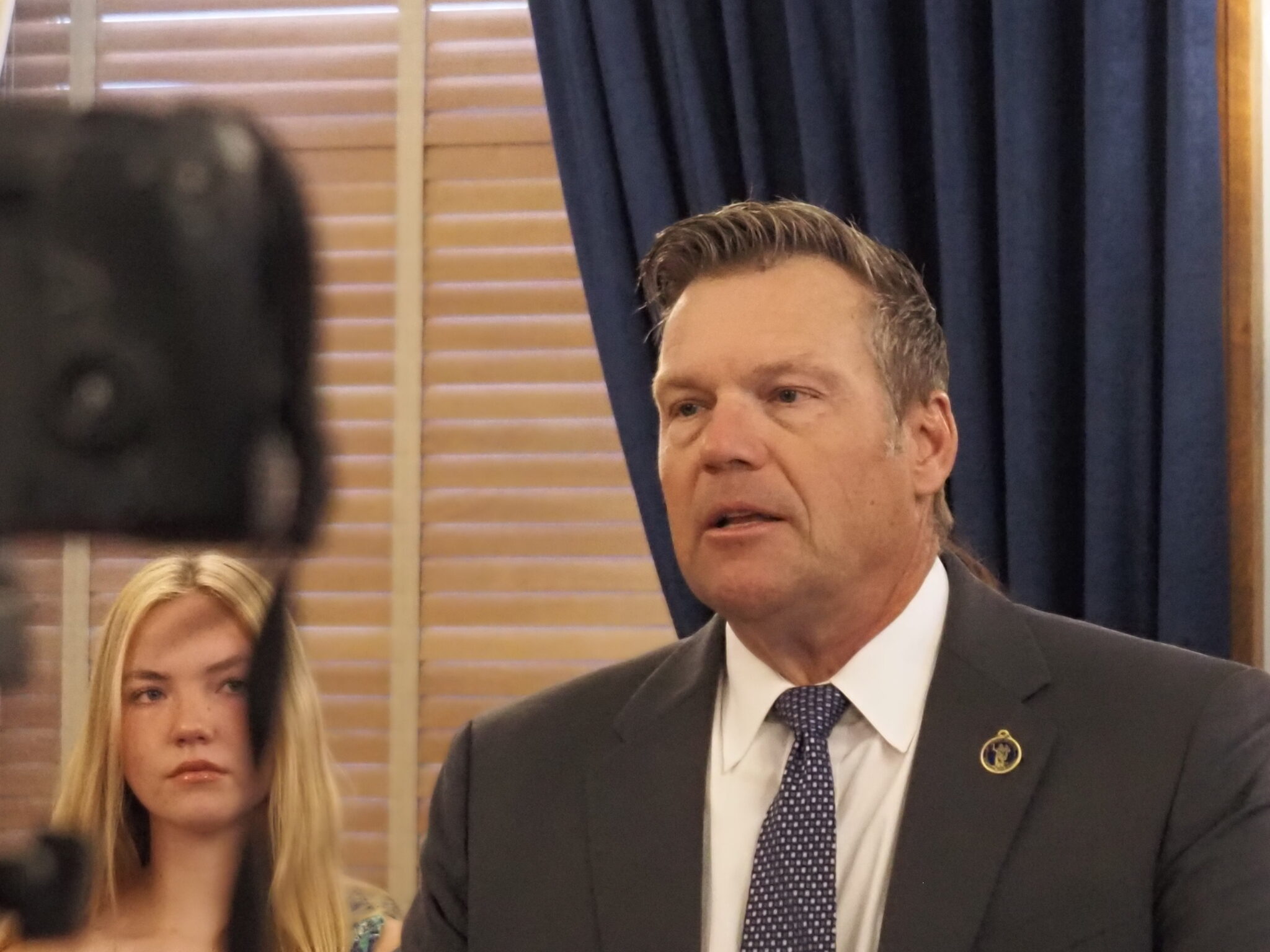
By Rachel Mipro | TOPEKA, Kan. — Kansas Attorney General Kris Kobach announced Tuesday he has sued President Joe Biden’s administration over the rewrite of federal rules to protect LGBTQ+ students.
Alaska, Utah and Wyoming partnered with Kansas on the lawsuit, which follows the U.S. Department of Education’s release in April of new guidelines to prohibit discrimination at federally funded schools.
Set to go into effect Aug. 1, the revised Title IX rules explicitly ban discrimination based on sexual orientation or gender identity. Under the revision, LGBTQ+ students who face discrimination will be entitled to a response from their school and can seek action from the federal government.
Kobach said the change would violate the First Amendment rights of teachers and school employees whose religious beliefs would prevent them from complying with the rule.
“It’s insanity,” Kobach said. “Biden’s Title IX rule is unconscionable. It’s dangerous to girls and women, and it’s against federal law.”
Explaining the 85-page lawsuit in a news conference Tuesday, Kobach focused on his assertion that transgender athletes shouldn’t participate in women’s sports. In 2023, Kansas lawmakers passed a ban prohibiting transgender student athletes from participating in girls and women’s sports. The state law could conflict with the new federal rules, although the federal revision doesn’t explicitly address transgender athletes.
“I can certainly tell you that if any of my girls are competing in sports against boys, that is going to make me very unhappy,” Kobach said.
The issue is whether cisgender and transgender girls should play together. When asked about his use of the term “boys” to describe transgender girls and women, and if he respected the transgender identity, Kobach said people had a right to change their appearance and presentation, but “the bottom line is that they can’t change the structure and other advantages that males gain.”
“Anyone who observes sports and observes the competition by these biological males in female sports has seen the obvious unfairness of it,” Kobach said. “The idea that someone should be punished or should be canceled by simply speaking what they have observed is really disturbing. It’s Orwellian if someone is canceled or punished simply for saying what they believe.”
Melissa Stiehler, advocacy director at Loud Light, a Kansas-based organization focused on LGBTQ+ rights and social issues, questioned Kobach’s motives.
“During his career, Mr. Kobach’s actions and legal theories have yet to show that he has the best interest of women and our legal protections at heart,” Stiehler said. “In fact, Kobach has actively sought to take away constitutional rights from Kansas women. With the experience of facing adversity as a woman, I fully encourage the AG to accept that transgender kids deserve protection from sex-based discrimination just as I received as a girl going through public school. Protection for trans kids doesn’t nullify any gains women and girls have made in our strides towards realizing equity.”
Kobach is part of a wave of attorney generals in red states that have scrambled to challenge the ruling since the publication of the revised guidelines. Legal counsel from Alliance Defending Freedom joined Kobach in the news conference. ADF is known for promoting anti-LGBTQ+ policies.
Civil rights advocates oppose the legal challenges to anti-discrimination rules.
“Kobach is claiming that he is standing up for girls and women,” said Micah Kubic, executive director of the Kansas branch of the American Civil Liberties Union. “But what he is really doing is continuing his decades-long crusade against our shared values and fundamental rights, using his misleading legal interpretations to try to transform the law into a tool that persecutes Kansans instead of protecting them.”
Reporters asked Kansas Gov. Laura Kelly about Kobach’s lawsuit after an unrelated news conference Tuesday.
“I wish that we would focus on issues that really make a difference in Kansans’ lives,” Kelly said. “I would suggest that that makes a difference in very few people’s lives, and not in a good way.”
Kobach’s lawsuit marks the latest stand in a series of anti-trans movements. Lawmakers passed a law in 2023 that bans gender marker changes on drivers’ licenses and birth certificates.
In this legislative session, lawmakers revived an effort to block teenagers from receiving gender-affirming care, such as hormones and puberty blockers. Senate Bill 233 also would have banned state employees from supporting “social transitioning,” which was defined to include the use of preferred pronouns. A Republican-driven effort to override Kelly’s veto narrowly failed in the House.
******************************************************************************************

A graduate of Louisiana State University, Rachel Mipro has covered state government in Baton Rouge and New Orleans. She and her fellow team of journalists were 2022 Goldsmith Prize Semi-Finalists for their work featuring the rise of the KKK in northern Louisiana, following racially-motivated shootings in 1960. With her move to the Midwest, Rachel is now turning her focus toward issues within Kansas public policies.
******************************************************************************************
The preceding article was previously published by the Kansas Reflector and is republished with permission.
Kansas Reflector is a nonprofit news operation providing in-depth reporting, diverse opinions and daily coverage of state government and politics. This public service is free to readers and other news outlets.
We’re part of States Newsroom, the nation’s largest state-focused nonprofit news organization.
Kansas
Kansas Republican votes no on trans ban
Representative Concannon, a Republican Representative, voted to sustain a veto of a gender affirming care ban in Kansas
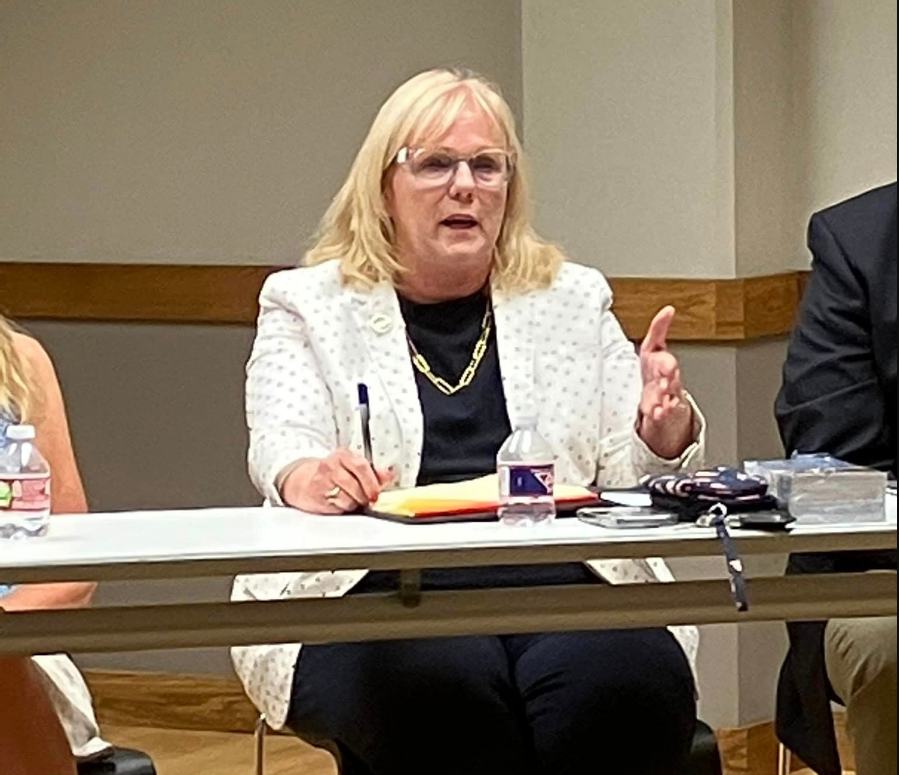
By Erin Reed | TOPEKA, Kan. – On Monday, the Kansas Legislature met to vote on Senate Bill 233, a bill that would ban gender-affirming care for transgender youth and impose strict restrictions on social transitions in any publicly funded buildings, including schools.
The Legislature had previously passed the bill, but it was vetoed by Governor Laura Kelly. Republicans, who had enough votes to override the veto, were expected to do so and ban gender-affirming care for transgender youth.
However, at the last moment, two Republicans, Representatives Susan Concannon and Jesse Borjon, unexpectedly broke ranks and voted to sustain the veto, preventing the bill from being signed into law.
Representative Concannon, who had previously voted in favor of the bill, reversed her decision and stepped forward to explain why, stating, “We hear of bullying and ask authorities to make it stop. We hear about mental health, about suicide, and ask why. We’re not listening to the impacted youth. Government involvement is not the answer. I voted for this bill in the past due to concerns about the surgery. With further consideration, this bill is vague beyond the surgery. These decisions belong between the team of professionals and the parents. The youth need our help, not government overreach. For all those who reached out, I hear you, and vote to sustain the governor’s veto.”
See her speech and the failure of the bill’s passage here:
Kansas has been a lightning rod for anti-trans legislation in recent years, and the defeat of a gender-affirming care ban in the state is likely to be seen as a big surprise among those following anti-LGBTQ+ legislation nationwide.
Previously, Kansas Republicans had passed a bill banning transgender individuals from bathrooms and ending legal recognition of their gender identities. This led Kansas Attorney General Kris Kobach to force transgender people to have their driver’s licenses and birth certificates reversed.
That law placed Kansas among the states with some of the harshest laws toward transgender people in the United States, leading some to view the passage of a gender-affirming care ban for youth as a foregone conclusion.
However, recent months have cast doubt on the willingness of Republicans nationwide to continue targeting transgender people using the legislative process, at least prior to the upcoming election, where such positions may be seen as ideologically extreme.
Several other states that have led the charge in legislation targeting transgender and LGBTQ+ people failed to pass any significant anti-trans or anti-LGBTQ+ legislation this year, including Florida, West Virginia, Georgia, and Iowa.
In a recent interview with Casey Parks of The Washington Post, Sarah Parshall Perry of the Heritage Foundation stated, “We’re finding this to be sort of a lightning rod issue…I think there is some legislative will to try to back off a little bit and possibly pump the brakes on what had been previously a more aggressive approach.”
Sensing such shifts, there has also been more effort in lobbying centrist and conservative legislators while appealing to values that resonate with conservatives, such as control of one’s health care, privacy rights, and personal liberty. One such group is GRACE For America, an organization that describes itself as focusing on “the movable middle” and “the middle right” in outreach and education.
A recent video from the group, for instance, features a combat veteran who speaks about his advocacy for his own transgender child. When asked about the Kansas vote, a member of the organization stated, “We fully support these brave Republican legislators in Kansas for exemplifying the values of liberty, respect, and dignity—not just for transgender people but for parents and families who understand that decisions on health care belong with them and not government officials. Their actions demonstrate that transgender rights can be bipartisan, and we are grateful to see more Republicans adopting this approach and call on others to learn from these examples.”
One of the major groups in Kansas doing such outreach has been Equality Kansas, which was part of a coalition of statewide organizations lobbying the legislature to sustain the veto. These organizations include the ACLU of Kansas, Kansas Interfaith Action, Loud Light Civic Action, Mainstream, Planned Parenthood Great Plains Votes, Trust Women Foundation, and Transformations.
Collectively, they led thousands of phone calls and emails to legislators in the state. Equality Kansas responded to the defeat, stating, “We are relieved that the House Republicans took time to listen to trans folks and take a step back to look at what is going on—that SB 233 and bills like it are founded in hate, not in fact. We need and will continue to work to engage Kansas community members and educate legislators.”
Had the bill passed, it would have been one of the most extreme bills targeting transgender youth in the United States. It not only would have banned surgery for trans teens, an exceedingly rare occurrence, but also hormone therapy and puberty blockers. Moreover, it would have barred state employees from “promoting social transition.” Social transition usually includes simple things such as pronouns, names, hairstyles, and clothing.
Many opposed to the bill interpreted it as potentially having far-reaching consequences for any teens who wished to go by different pronouns or names in schools, and could potentially have forbidden state employees from recognizing such transitions or expressions of gender identity.
Now with Republican defections, this bill will not become law in Kansas, giving Kansans who live under some of the harshest anti-trans laws in the United States some reprieve when it comes to their medical care.
****************************************************************************

Erin Reed is a transgender woman (she/her pronouns) and researcher who tracks anti-LGBTQ+ legislation around the world and helps people become better advocates for their queer family, friends, colleagues, and community. Reed also is a social media consultant and public speaker.
******************************************************************************************
The preceding article was first published at Erin In The Morning and is republished with permission.
Kansas
Kansas Senate overrides governor’s veto on anti-trans care bill
Sen. Mark Steffen said the predators in today’s society are “woke” health care providers who are preying on “confused” children
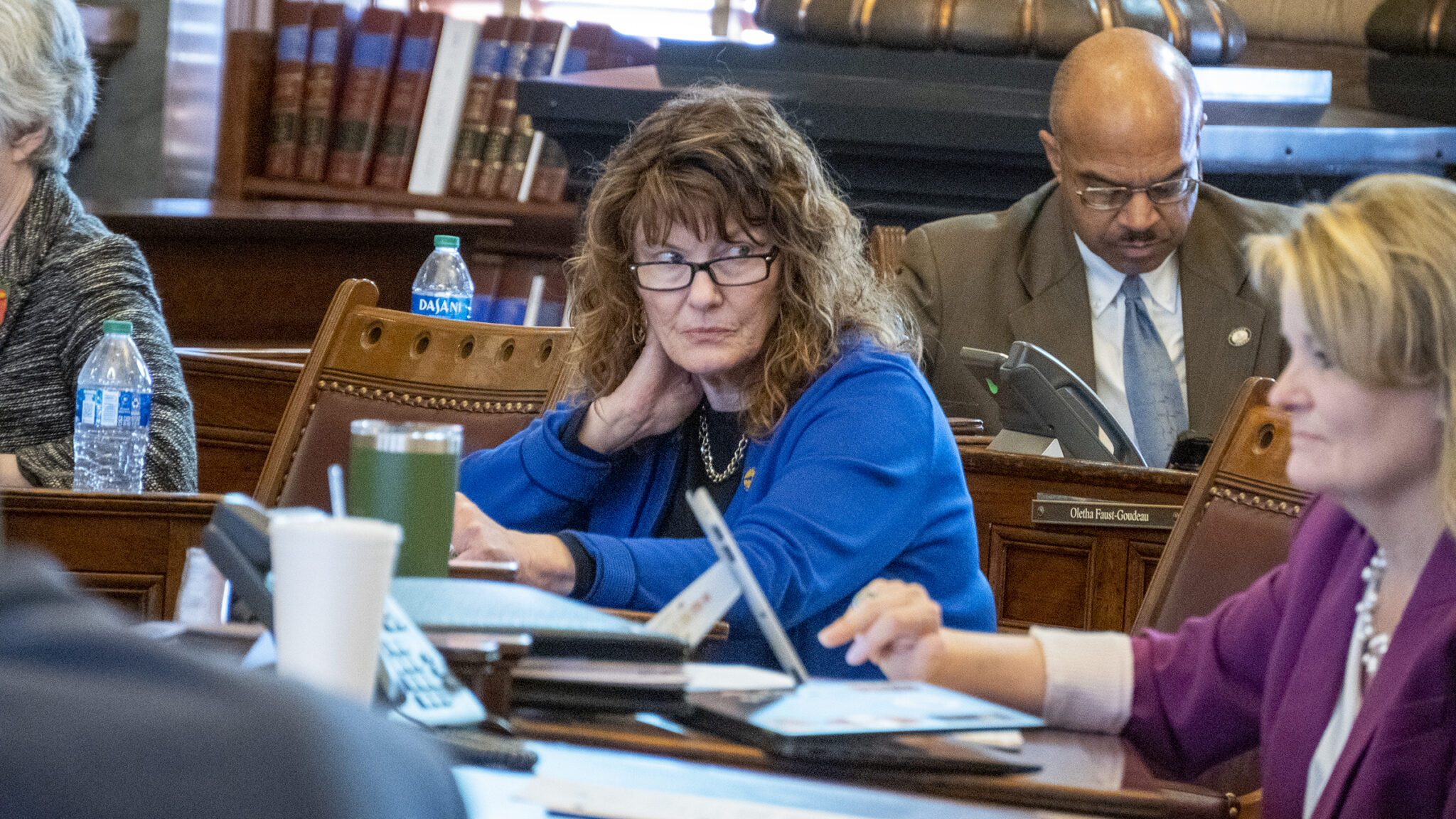
By Sherman Smith & Rachel Mipro | TOPEKA, Kan. — As the Kansas Legislature renewed its yearslong assault on transgender children, Sen. Mary Ware told her Senate colleagues Monday she had a “simple” question for them.
“What is the acceptable number of youth suicides?” Ware asked.
The Senate voted 27-13 to override Gov. Laura Kelly’s veto of Senate Bill 233, which bans gender-affirming care, including hormone therapy and other treatments recognized as necessary by medical professionals, for anyone younger than 18. The bill also bans state employees from supporting “social transitioning,” which is defined to include an individual changing their preferred pronouns or manner of dress.
The bill still requires a vote in the House, where 84 of the 125 members are needed to override the governor’s veto. The House passed the bill 82-39 on March 27 with two Republicans and two Democrats absent.
“We need to find one more Republican with a spine,” said Rep. Tobias Schlingensiepen, D-Topeka.
Two Republicans — Sen. John Doll of Garden City and Sen. Carolyn McGinn of Sedgwick — joined the chamber’s 11 Democrats in opposing the legislation.
The Suicide and Crisis Lifeline is a hotline for individuals in crisis or for those looking to help someone else. To speak with a certified listener, call 988.
Crisis Text Line is a texting service for emotional crisis support. To speak with a trained listener, text HELLO to 741741. It is free, available 24/7, and confidential.
Ware and other Democrats pointed to extensive medical research that shows transgender children, who are already at an elevated risk for suicide, are more likely to die from suicide if they don’t receive gender-affirming care.
“This bill ignores, or should I say tramples, on the rights of some Kansas citizens to live peaceably, lawfully and free to make their own decisions about their own bodies,” Ware said.
Republicans argued the bill would protect children from life-altering decisions they could end up regretting.
Sen. Beverly Gossage, R-Eudora, said she receives “beautiful cards” and emails from parents who thank her for pursuing the legislation.
“We all sympathize to those who are suffering from gender dysphoria,” Gossage said.
Sen. Mark Steffen, R-Hutchinson, said the predators in today’s society are “woke” health care providers who are preying on “confused” children and parents.
“No more than we would ever tell somebody with anorexia that they’re fat would we tell a boy that they’re a girl or girl that they’re a boy,” Steffen said.
Under the law, medical professionals would lose their license if they provide gender-affirming care, and parents would be allowed to sue them for punitive damages up until the child turns 28 years old.
In a teary speech, Senate Minority Leader Dinah Sykes, D-Lenexa, said she has heard from hundreds of Kansans who see hormone treatment as a life raft — and are concerned the Legislature is about to rip that away.
Research consistently shows that supportive environments, including access to gender-affirming care, reduces the mental health risk for kids, Sykes said, while denying that care amplifies feelings of isolation, shame and hopelessness.
“So for our transgender community, I will say there are some, who, we are in your camp,” Sykes said. “We may not understand all the complexities that you go through, but you have a place in this state. And we accept you and we cherish you. And regardless of where this vote goes, there is someone who is here, who cares.”
******************************************************************************************

Sherman Smith is the editor in chief of Kansas Reflector. He writes about things that powerful people don’t want you to know. A two-time Kansas Press Association journalist of the year, his award-winning reporting includes stories about education, technology, foster care, voting, COVID-19, sex abuse, and access to reproductive health care. Before founding Kansas Reflector in 2020, he spent 16 years at the Topeka Capital-Journal. He graduated from Emporia State University in 2004, back when the school still valued English and journalism. He was raised in the country at the end of a dead end road in Lyon County.

A graduate of Louisiana State University, Rachel Mipro has covered state government in Baton Rouge and New Orleans. She and her fellow team of journalists were 2022 Goldsmith Prize Semi-Finalists for their work featuring the rise of the KKK in northern Louisiana, following racially-motivated shootings in 1960. With her move to the Midwest, Rachel is now turning her focus toward issues within Kansas public policies.
******************************************************************************************
The preceding article was previously published by the Kansas Reflector and is republished with permission.
Kansas Reflector is a nonprofit news operation providing in-depth reporting, diverse opinions and daily coverage of state government and politics. This public service is free to readers and other news outlets.
We’re part of States Newsroom, the nation’s largest state-focused nonprofit news organization.
Kansas
Kansas Governor lets web porn bill become law without signature
Critics warn it could censor works of art, classic books and LGBTQ content, as well as provide sensitive ID info to unregulated 3rd parties

By Tim Carpenter | TOPEKA, Kan. — Gov. Laura Kelly chose not to veto a bill Friday that earned bipartisan support among House and Senate members eager to require commercial websites to deploy age-verification software to limit online access by Kansas minors to nudity or sexually exciting images and text.
Kelly, a Democratic governor working with a Legislature brandishing Republican supermajorities, said she would allow Senate Bill 394 to become law without her signature despite reservations the restrictions could trample constitutional rights and inspire legal challenges.
The bill was approved unanimously in the Senate and on a 92-31 vote by the House. That left little doubt the Senate could muster 27 votes and the House could bring together 84 votes to beat a veto.
“While well-meaning in its efforts to protect children from content the Legislature considers ‘harmful to minors,’ this bill is vague in its application and may end up infringing on constitutional rights, which is an issue being litigated in other jurisdictions over similar bills,” Kelly said.
Under the bill, parents or guardians of anyone under 18 gaining access to online pornography could file a lawsuit and seek damages of $50,000 or more against companies that didn’t successfully screen minors from material depicting or describing nudity, sexual conduct, sexual excitement or sadomasochistic abuse in a manner offensive to community standards. The mandate would apply to websites if at least one-fourth of viewed pages in any month contained material offensive to minors.
Identical versions of the bill were introduced by Salina Sen. J.R. Claeys and Wichita Rep. Patrick Penn, both Republicans, to require identity verification technology to deflect youthful consumers who might be drawn to raunchy online content posted anywhere in the world. The attorney general would be responsible for investigating reports of noncompliance. He could seek penalties of $500 to $10,000 for each underage visit to an off-limits site.
“Defending the integrity of the family is a core value of the Catholic church,” said Chuck Weber, executive director of the Kansas Catholic Conference and a proponent of the bill. “SB 394 is very good legislation that will help prevent the pornography industry from capturing and addicting our youth to destructive behavior.”
More red tape
On Friday, the Kansas governor vetoed a bill that would require the state budget director to determine the cost of complying with all rules and regulations drafted by state agencies. It would grant the gubernatorially appointed budget director authority to reject rules and regulations.
Kelly said the bill was objectionable because it “would insert bureaucratic red tape intended to legislatively interfere with the timely implementation of necessary and important rules and regulations. Many of these regulations are for the protection and safety of Kansans.”
The vote in the Senate was 27-13. It cleared the House 81-39.
The measure was championed by lawmakers keen to rein in state regulations or rules considered burdensome or that added to the cost of doing business in Kansas. It would target any rule or regulation if implementation or compliance costs incurred by a business over a five-year period topped $1 million. That benchmark could be exceeded if the Legislature ratified the proposed state rule or regulation.
“This veto can be easily explained by a difference in philosophies,” said House Speaker Dan Hawkins, R-Wichita. “The governor and her party believe that more government control is the answer to our problems. House Republicans believe there should be checks placed on the administrative state and that’s why we’ll be working to override her veto and rein in the power grab by unelected bureaucrats.”
Randy Stookey, a lobbyist representing the Kansas Grain and Feed Association, said regulatory compliance with state rules and regulations often came at a high cost.
“This economic impact is something that must be considered carefully,” he said. “Modeled after recent legislation in other states, the bill would enhance the review of required state agency analysis of the implementation and compliance costs of proposed regulations on the regulated community.”
Regulating bags, hair
The Legislature approved a bill advocated by business lobbying interests to prohibit cities and county governments from regulating containers used to distribute goods. The bill would forbid government intrusion into design of bags, cups, packages, containers, bottles, devices — even straws — preferred by a retailer.
House Bill 2446 would allow containers made of paper, plastic, cardboard, cloth, aluminum, glass or recycled materials. In other words, the prohibition against Lawrence businesses using single-use thin plastic bags — common in grocery stores or for carry-out food — would be nullified.
Kelly vetoed the bill because she considered it an overreach by the Legislature into decisions of officials elected to serve in municipal government.
“I believe in local control and that local officials should be held accountable by their constituents, stakeholders and businesses,” Kelly said. “This bill lacks sufficient protection to ensure local units of government are able to play a meaningful role in decision making on issues impacting their communities.”
Meanwhile, Kelly vetoed Senate Bill 434 that would deregulate the practice of hair removal known as “sugaring.” She expressed concern withdrawing the state from oversight of temporary hair removal by application of sugar, lemon and water, or its equivalent, could be harmful to minors.
“I have serious concerns that deregulating sugaring … could lead to safety and sanitation problems,” Kelly said. “We have a responsibility to protect Kansans, and this deregulation would threaten the health and safety of Kansans, particularly our children.”
She said it was proper to keep regulation of the industry within purview of the Kansas Board of Cosmetology. She said practitioners should be held to health and safety standards of cosmetologists, which would include criminal background checks, training and state licensing.
******************************************************************************************

Tim Carpenter has reported on Kansas for 35 years. He covered the Capitol for 16 years at the Topeka Capital-Journal and previously worked for the Lawrence Journal-World and United Press International.
The preceding story was previously published by the Kansas Reflector and is republished with permission.
******************************************************************************************
The Kansas Reflector is a nonprofit news operation providing in-depth reporting, diverse opinions and daily coverage of state government and politics. This public service is free to readers and other news outlets. We are part of States Newsroom: the nation’s largest state-focused nonprofit news organization, with reporting from every capital.
Kansas
Kansas Gov. Laura Kelly vetoes ban on gender-identity health care
Republicans vow to seek override of Democratic governor’s actions. Senate President Ty Masterson says reflects her radical left agenda
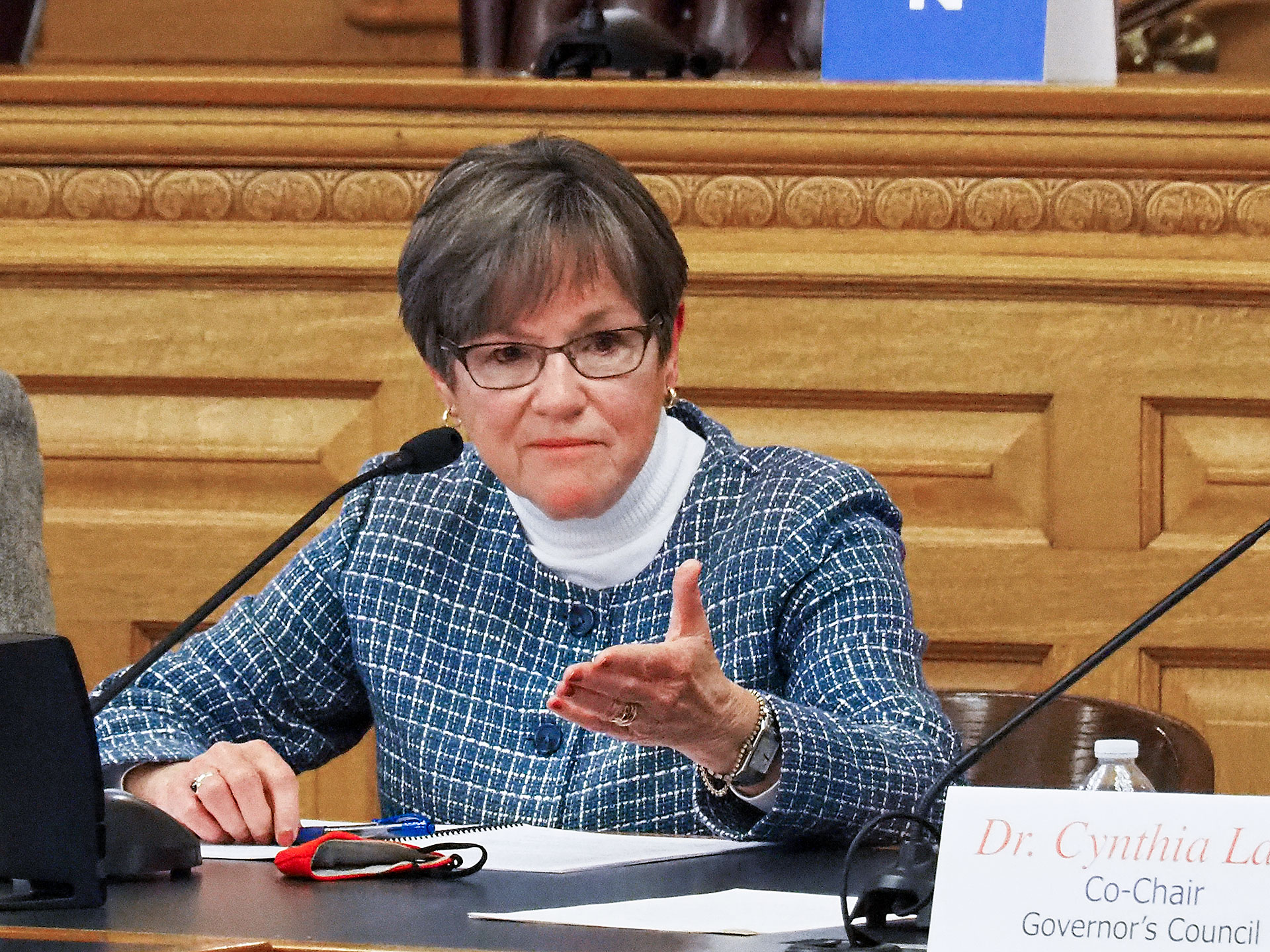
By Tim Carpenter | TOPEKA, Kan. — Gov. Laura Kelly flexed a veto pen to reject bills Friday prohibiting gender-identity health care for transgender youth, introducing a vague crime of coercing someone to have an abortion and implementing a broader survey of women seeking abortion that was certain to trigger veto override attempts in the Republican-led House and Senate.
The decisions by the Democratic governor to use her authority to reject these health- and abortion-rights bills didn’t come as a surprise given her previous opposition to lawmakers intervening in personal decisions that she believed ought to remain the domain of families and physicians.
Kelly said Senate Bill 233, which would ban gender-affirming care for transgender minors in Kansas, was an unwarranted attack on a small number of Kansans under 18. She said the bill was based on a politically distorted belief the Legislature knew better than parents how to raise their children.
She said it was neither a conservative nor Kansas value to block medical professionals from performing surgery or prescribing puberty blockers for their patients. She said stripping doctors of their licenses for serving health interests of patients was wrong. Under the bill, offending physicians could be face lawsuits and their professional liability insurance couldn’t be relied on to defend themselves in court.
“To be clear, this legislation tramples parental rights,” Kelly said. “The last place that I would want to be as a politician is between a parent and a child who needed medical care of any kind. And, yet, that is exactly what this legislation does.”
Senate President Ty Masterson, R-Andover, and House Speaker Dan Hawkins, R-Wichita, responded to the governor by denouncing the vetoes and pledging to seek overrides when legislators returned to the Capitol on April 26. The transgender bill was passed 27-13 in the Senate and 82-39 in the House, suggesting both chambers were in striking distance of a two-thirds majority necessary to thwart the governor.
“The governor has made it clear yet again that the radical left controls her veto pen,” Masterson said. “This devotion to extremism will not stand, and we look forward to overriding her vetoes when we return in two weeks.”
Cathryn Oakley, senior director of the Human Rights Campaign, said the ban on crucial, medically necessary health care for transgender youth was discriminatory, designed to spread dangerous misinformation and timed to rile up anti-LGBTQ+ activists.
“Every credible medical organization — representing over 1.3 million doctors in the United States — calls for age-appropriate, gender-affirming care for transgender and nonbinary people,” Oakley said. “This is why majorities of Americans oppose criminalizing or banning gender-affirming care.”
Abortion coercion
Kelly also vetoed House Bill 2436 that would create the felony crime of engaging in physical, financial or documentary coercion to compel a girl or woman to end a pregnancy despite an expressed desire to carry the fetus to term. It was approved 27-11 in the Senate and 82-37 in the House, again potentially on the cusp of achieving a veto override.
The legislation would establish sentences of one year in jail and $5,000 fine for those guilty of abortion coercion. The fine could be elevated to $10,000 if the adult applying the pressure was the fetuses’ father and the pregnant female was under 18. If the coercion was accompanied by crimes of stalking, domestic battery, kidnapping or about 20 other offenses the prison sentence could be elevated to 25 years behind bars.
Kelly said no one should be forced to undergo a medical procedure against their will. She said threatening violence against another individual was already a crime in Kansas.
“Additionally, I am concerned with the vague language in this bill and its potential to intrude upon private, often difficult, conversations between a person and their family, friends and health care providers,” the governor said. “This overly broad language risks criminalizing Kansans who are being confided in by their loved ones or simply sharing their expertise as a health care provider.”
Hawkins, the House Republican leader, said coercion was wrong regardless of the circumstances and Kelly’s veto of the bill was a step too far to the left.
“It’s a sad day for Kansas when the governor’s uncompromising support for abortion won’t even allow her to advocate for trafficking and abuse victims who are coerced into the procedure,” Hawkins said.
Emily Wales, president and CEO of Planned Parenthood Great Plains Votes, said HB 2436 sought to equate abortion with crime, perpetuate false narratives and erode a fundamental constitutional right to bodily autonomy. The bill did nothing to protect Kansas from reproductive coercion, including forced pregnancy or tampering with birth control.
“Planned Parenthood Great Plains Votes trusts patients and stands firmly against any legislation that seeks to undermine reproductive rights or limit access to essential health care services,” Wales said.
Danielle Underwood, spokeswoman for Kansas for Life, said “Coercion Kelly” demonstrated with this veto a lack of compassion for women pushed into an abortion.
The abortion survey
The House and Senate approved a bill requiring more than a dozen questions be added to surveys of women attempting to terminate a pregnancy in Kansas. Colorful debate in the House included consideration of public health benefits of requiring interviews of men about reasons they sought a vasectomy birth control procedure or why individuals turned to health professionals for treatment of erectile dysfunction.
House Bill 2749 adopted 81-39 in the House and 27-13 in the Senate would require the Kansas Department of Health and Environment to produce twice-a-year reports on responses to the expanded abortion survey. The state of Kansas cannot require women to answer questions on the survey.
Kelly said in her veto message the bill was “invasive and unnecessary” and legislators should have taken into account rejection in August 2022 of a proposed amendment to the Kansas Constitution that would have set the stage for legislation further limiting or ending access to abortion.
“There is no valid medical reason to force a woman to disclose to the Legislature if they have been a victim of abuse, rape or incest prior to obtaining an abortion,” Kelly said. “There is also no valid reason to force a woman to disclose to the Legislature why she is seeking an abortion. I refuse to sign legislation that goes against the will of the majority of Kansans who spoke loudly on August 2, 2022. Kansans don’t want politicians involved in their private medical decisions.”
Wales, of Planned Parenthood Great Plains Votes, said the bill would have compelled health care providers to “interrogate patients seeking abortion care” and to engage in violations of patient privacy while inflicting undue emotional distress.
Hawkins, the Republican House speaker, said the record numbers of Kansas abortions — the increase has been driven by bans or restrictions imposed in other states — was sufficient to warrant scrutiny of KDHE reporting on abortion. He also said the governor had no business suppressing reporting on abortion and criticized her for tapping into “irrational fears of offending the for-profit pro-abortion lobby.”
******************************************************************************************

Tim Carpenter has reported on Kansas for 35 years. He covered the Capitol for 16 years at the Topeka Capital-Journal and previously worked for the Lawrence Journal-World and United Press International.
The preceding story was previously published by the Kansas Reflector and is republished with permission.
******************************************************************************************
The Kansas Reflector is a nonprofit news operation providing in-depth reporting, diverse opinions and daily coverage of state government and politics. This public service is free to readers and other news outlets. We are part of States Newsroom: the nation’s largest state-focused nonprofit news organization, with reporting from every capital.
Kansas
Kansas internet porn bill passes, could lead to LGBTQ censorship
The measure passed 92-31, mainly along party lines, and now goes to the governor’s desk for final consideration

By Rachel Mipro | TOPEKA, Kan. — Kansas’s Republican-dominated House has given final approval to a wide-ranging bill meant to stop minors from accessing porn, but a bipartisan group of critics warn it could censor works of art, classic books and LGBT content, as well as provide sensitive identification information to unregulated third parties.
The measure passed 92-31, mainly along party lines, and now goes to the governor’s desk for final consideration. During a discussion of votes, Rep. Kenneth Collins, a Mulberry Republican who splintered from his party to vote against the measure, said he worried about the broader implications of the legislation.
“I have a concern that while the bill does prohibit material that is harmful to minors, it leaves subjectivity as to what this bill bans,” Collins said. “I also have concerns that the information used to verify a person’s age could fall into the hands of entities who could use it for fraudulent purposes.”
Senate Bill 394 would require age verification for websites that contain 25% or more content that is “harmful to minors,” as defined by state statute.
State statute delineates content that is harmful to minors as the description, exhibition, presentation, or representation of nudity, sexual conduct, sexual excitement or sadomasochistic abuse. State statute also includes homosexuality in its definition of “sexual conduct.” Several Democrats said this provision could lead to a ban on LGBTQ online materials for those under 18.
Critics say the bill could also restrict: Blogs listing the most gay-friendly cities, a website dedicated to providing seminal books such as the “The Catcher in the Rye” by J. D. Salinger, or art sites with pictures of nude sculptures such as Michelangelo’s statue of the biblical hero David.
Senate lawmakers voted 40-0 to approve the bill in early February.
********************************************************

A graduate of Louisiana State University, Rachel Mipro has covered state government in Baton Rouge and New Orleans. She and her fellow team of journalists were 2022 Goldsmith Prize Semi-Finalists for their work featuring the rise of the KKK in northern Louisiana, following racially-motivated shootings in 1960. With her move to the Midwest, Rachel is now turning her focus toward issues within Kansas public policies.
The preceding story was previously published by the Kansas Reflector and is republished with permission.
******************************************************************************************
The Kansas Reflector is a nonprofit news operation providing in-depth reporting, diverse opinions and daily coverage of state government and politics. This public service is free to readers and other news outlets. We are part of States Newsroom: the nation’s largest state-focused nonprofit news organization, with reporting from every capital.
Kansas
Trans Kansans appeal court block on changes to gender markers
Shawnee County District Court Judge Teresa Watson issued a block on gender marker changes for driver’s licenses

By Rachel Mipro | TOPEKA, Kan. — Transgender Kansans are challenging a district court’s ban on changing driver’s license gender markers as the courts try to determine the full scope of a divisive and vague law governing the state’s transgender residents.
The American Civil Liberties Union of Kansas, which represents the five transgender Kansans in the case, announced the appeal Thursday. D.C. Hiegert, LGBTQ+ legal fellow for the ACLU of Kansas, said the court’s ruling was based on an “overbroad interpretation” of the law.
“The court has decided that the state’s administrative interest outweighs the threat of harassment, discrimination and violence to individual Kansans,” Hiegert said. “This is clearly dangerous, and it wholly contradicts the tragic reality of current trends.”
Shawnee County District Judge Teresa Watson last week issued a block on gender marker changes for driver’s licenses, siding with Kansas Attorney General Kris Kobach’s interpretation of Senate Bill 180. Under the law, genders are defined by reproductive organs, and state agencies that collect vital statistics are directed to identify individuals “as either male or female at birth.” Kobach argued this provision proves the need for driver’s licenses to show sex assigned at birth.
Kobach called the decision a “victory for the rule of law and common sense.” He filed the lawsuit against the Kansas Department of Revenue’s Division of Vehicles in July.
After he filed, the district court issued a temporary restraining order blocking Gov. Laura Kelly’s administration from making gender marker changes on identity cards and driver’s licenses. The court granted the ACLU of Kansas permission to intervene in the lawsuit on behalf of five transgender Kansans who would be harmed by the gender marker ban, and arguments were held in January.
“The Kansas Constitution’s Bill of Rights guarantees all Kansans, including those who are transgender, rights of personal autonomy, privacy and equality,” Hiegert said. “The court has mistakenly adopted the attorney general’s overbroad interpretation of SB 180, which provides no language whatsoever requiring the state to force Kansans to carry inaccurate identification cards, against their fundamental rights.”
******************************************************************************************

A graduate of Louisiana State University, Rachel Mipro has covered state government in Baton Rouge and New Orleans. She and her fellow team of journalists were 2022 Goldsmith Prize Semi-Finalists for their work featuring the rise of the KKK in northern Louisiana, following racially-motivated shootings in 1960. With her move to the Midwest, Rachel is now turning her focus toward issues within Kansas public policies.
The preceding story was previously published by the Kansas Reflector and is republished with permission.
******************************************************************************************
The Kansas Reflector is a nonprofit news operation providing in-depth reporting, diverse opinions and daily coverage of state government and politics. This public service is free to readers and other news outlets. We are part of States Newsroom: the nation’s largest state-focused nonprofit news organization, with reporting from every capital.
Kansas
Kansas GOP advances ban on gender-affirming trans youth care
‘Hungry for control’ State employees would no longer be able to so much as call transgender children by their chosen pronouns under the bill
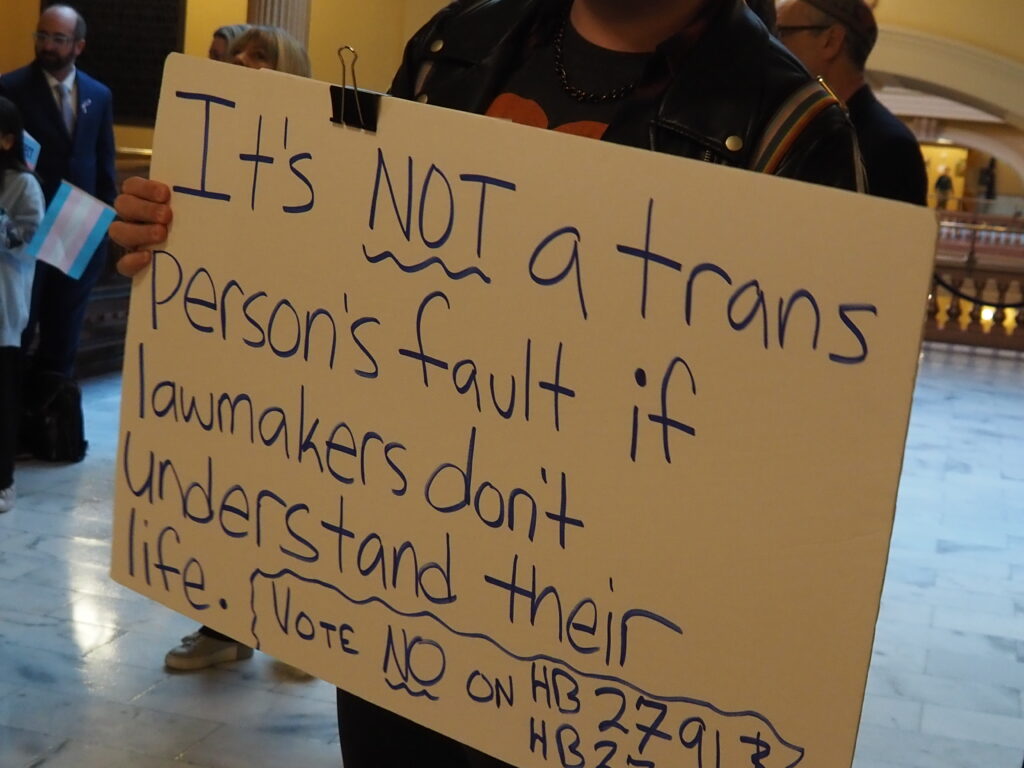
By Rachel Mipro | TOPEKA, Kan. – State employees would no longer be able to so much as call transgender children by their chosen pronouns under a bill blocking transgender minors in the state from receiving gender-affirming care. The legislation is barreling toward the governor’s desk.
Passed by the House with a 80-40 vote, Senate Bill 233 bans health care professionals from using surgery or puberty blockers to treat transgender children. Despite Republican lawmakers’ claims that puberty blockers and hormone therapy are unsafe, the same therapy will be allowed for cisgender children with developmental disorders or other health conditions.
The bill now heads to the Senate.
Similar legislation was vetoed by Democratic Gov. Laura Kelly last session, and a veto override attempt failed during the last legislative session. House lawmakers will need 84 votes to override a potential Kelly veto. With four Republican lawmakers absent during the Wednesday vote, the Republican House supermajority may have enough votes to do so.
Under the legislation, providers who offer gender-affirming care to minors could have their licenses yanked. Another provision allows for lawsuits against providers who offer gender-affirming care up to 10 years after their patients turn 18. The bill bans the use of state funds and resources for medical or social transitioning. It would also ban state employees from helping minors to “social transition,” such as using a trans child’s preferred pronouns.
In a joint statement celebrating the bill’s passage, Republican House Speaker Dan Hawkins, House Majority Leader Chris Croft and Speaker Pro Tempore Blake Carpenter compared the ban to age limitations on alcohol consumption.
“One of our jobs as legislators is to ensure the right protections are in place for the well-being of Kansas kids,” the statement read. “There are numerous examples of this including age restrictions for the purchase of alcohol or cigarettes, gambling, and other practices that can lead to sustained, negative outcomes for vulnerable youth. Kids’ brains aren’t fully developed to the point they can make these life-altering decisions.”
These restrictions go against commonly accepted medical practices. Gender-affirming care for youths is supported by health care organizations including American Medical Association and the American Academy of Child and Adolescent Psychiatry.
Multiple studies show gender-affirming care for transgender minors help alleviate distress and depression for a community that faces heightened risk of suicide and social isolation. Transgender Kansans and parents of trans Kansans themselves urged lawmakers to reconsider the bill multiple times over several bill hearings.
“Anyone who voted yes on SB 233 is going to hell. like straight up. I want to practice therapy in this state but with laws like this, who knows if I’ll be able to?” tweeted Adam Kellogg following the bill’s passage. Kellogg is a transgender man and activist that has made multiple appearances at the Statehouse to campaign against harmful legislation.
The move inches Kansas closer to joining the 22 states that have similar bans, including Oklahoma, Missouri, Texas and Nebraska, part of a wave of anti-trans legislation pushed by Republican-dominated legislatures throughout the U.S. and in conservative governments abroad.
House Minority Leader Vic Miller of Topeka condemned the legislation.
“Not only does the Republican Party think they have the right to tell parents how to best raise their children, but they’re criminalizing health care workers during a time when we struggle to find enough doctors in the state for basic care,” Miller said. “They just can’t help themselves, as proven by the annual iterations of bills like this. Let parents parent and let health care workers provide care.”
******************************************************************************************

A graduate of Louisiana State University, Rachel Mipro has covered state government in Baton Rouge and New Orleans. She and her fellow team of journalists were 2022 Goldsmith Prize Semi-Finalists for their work featuring the rise of the KKK in northern Louisiana, following racially-motivated shootings in 1960. With her move to the Midwest, Rachel is now turning her focus toward issues within Kansas public policies.
The preceding story was previously published by the Kansas Reflector and is republished with permission.
******************************************************************************************
The Kansas Reflector is a nonprofit news operation providing in-depth reporting, diverse opinions and daily coverage of state government and politics. This public service is free to readers and other news outlets. We are part of States Newsroom: the nation’s largest state-focused nonprofit news organization, with reporting from every capital.
Kansas
Trans kids treatment again up for discussion at Kansas Statehouse
Gender-affirming care for youths is supported by health care organizations including American Medical Association
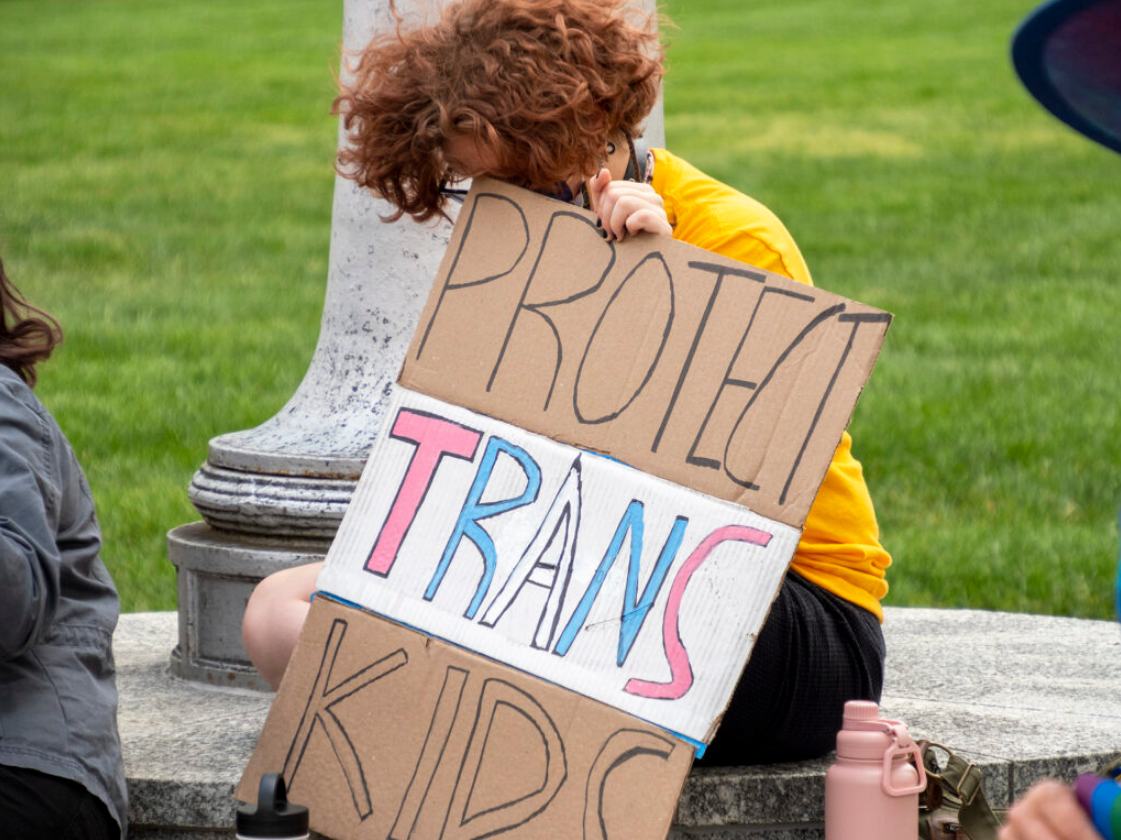
By Rachel Mipro | TOPEKA, Kan. – The state’s LGBTQ+ community was rocked in 2023 when lawmakers pushed through a wide-ranging anti-trans law that has led to a ban on gender marker changes on drivers’ licenses. Now Republican lawmakers and the state’s top law enforcement officer are reviving their campaign against transgender youth.
Kansas made news last year when it became the 20th state to pass a transgender student athlete ban into law in April, after lawmakers overrode Gov. Laura Kelly’s veto. The GOP-dominated Legislature also adopted Senate Bill 180 last year through veto override.
That legislation, which continues to be the subject of litigation, has led to a temporary restraining order blocking Kelly’s administration from making gender marker changes on identity cards and driver’s licenses.
Lawmakers are now returning to legislation that failed last session, such as gender-affirming care restrictions.
Rep. Ron Bryce, a Coffeyville Republican, requested the introduction of House Bill 2791, which would ban any organization that receives state funds from recommending gender-affirming care for transgender Kansans under the age of 18. The state’s medical assistance program would be blocked from providing coverage for gender-affirming care for these minors, among other provisions.
Gender-affirming care for youths is supported by health care organizations including American Medical Association and the American Academy of Child and Adolescent Psychiatry, which say banning gender-affirming care for transgender minors is damaging and not rooted in science.
Rep. Brenda Landwehr, R-Wichita, requested the introduction of House Bill 2792, which would ban gender reassignment for those under the age of 18. The bill does not have a scheduled hearing yet.
Bryce also introduced House Bill 2793, which was heard Thursday in a House health committee. The bill prohibits health care services for minors without parental consent. In Kansas, parental consent requirements already exist for medical and behavioral health care, but there are exceptions for emergency or crisis situations, such as physical abuse, emergency mental health crises or sexual abuse.
“I feel it’s important for us to make sure that we don’t go down the path of debasing parental rights when it comes to directing the care of our children,” Bryce said. “This bill provides assurance that consent of a parent or guardian is required for treatment of children in the vast majority of situations.”
Several medical health professionals spoke against the bill, calling it overbroad. Some said the bill could block anything from helping stop a child’s nosebleed to preventing teens struggling with drug addiction or coping with pregnancy from seeking care.
“Adolescents facing sensitive issues like substance use, sexually transmitted disease, or reproductive health may avoid seeking care if parental consent is required,” said Dena Hubbard, on behalf of the Kansas Chapter of the American Academy of Pediatrics. “Fear of judgment or repercussions may act as formidable barriers, resulting in avoidance or delay in seeking necessary medical attention.”
Kansas Attorney General Kris Kobach has also promoted this take on parental rights, telling public school districts that they have to out transgender students to their parents despite no legal obligation to do so.
Kobach sent letters to six Kansas school districts in December, telling them not to “socially transition” students without parents’ knowledge. He issued a public statement on the matter in early February, after four districts refused to rewrite policies on the matter.
“A child changing his or her gender identity has major long-term medical and psychological ramifications,” Kobach said. “Parents should know, and have an opportunity to be involved in, such an important aspect of their well-being.”
Micah Kubic, executive director of the American Civil Liberties Union of Kansas, condemned the move as unlawful and cruel.
“Quite aside from its brazen disregard for the law or the Constitution, the type of forced outing Attorney General Kobach seeks to impose on school districts and students is cruel, dangerous, and a repudiation of our shared values,” Kubic said. “Kansas students should all be able to live freely and in peace as their authentic selves without the intrusion of a state Attorney General inventing reasons to refashion the law into an instrument of his own extremist views.”
******************************************************************************************

A graduate of Louisiana State University, Rachel Mipro has covered state government in Baton Rouge and New Orleans. She and her fellow team of journalists were 2022 Goldsmith Prize Semi-Finalists for their work featuring the rise of the KKK in northern Louisiana, following racially-motivated shootings in 1960. With her move to the Midwest, Rachel is now turning her focus toward issues within Kansas public policies.
The preceding story was previously published by the Kansas Reflector and is republished with permission.
******************************************************************************************
The Kansas Reflector is a nonprofit news operation providing in-depth reporting, diverse opinions and daily coverage of state government and politics. This public service is free to readers and other news outlets. We are part of States Newsroom: the nation’s largest state-focused nonprofit news organization, with reporting from every capital.
-

 Commentary4 days ago
Commentary4 days agoThe Supreme Court’s ‘Don’t Read Gay’ ruling
-

 News2 days ago
News2 days agoWest Hollywood to advance protections for diverse and non-nuclear families
-

 Arts & Entertainment3 days ago
Arts & Entertainment3 days ago2025 Emmy nominations: ‘Hacks’ and ‘The Last of Us’ bring queer excellence to the table
-

 a&e features4 days ago
a&e features4 days agoThe art of controlled chaos: Patrick Bristow brings the Puppets to life
-

 Movies3 days ago
Movies3 days ago‘Superman’ is here to to save us, despite MAGA backlash
-

 Sports3 days ago
Sports3 days agoHololive and Dodgers create a home for queer fandom
-

 Events2 days ago
Events2 days agoLos Angeles Blade to take special part in NLGJA Los Angeles inaugural journalism awards







